- Home
- Kim Newman
Life's Lottery Page 2
Life's Lottery Read online
Page 2
Unlike many of your contemporaries, you do not remember a time when your family did not have a television set. The first Kennedy assassination makes no impression on you, but you vividly remember the first episode of Doctor Who, in which two teachers learn that one of their pupils is from another planet and that her white-haired grandfather has a time machine disguised as a police phone box. Possibly, you later discover Doctor Who started the weekend Kennedy was shot and wonder how you can remember one but not the other.
In your childhood, Doctor Who is a more important figure than John Kennedy. William Hartnell will regenerate as Patrick Troughton before you learn that Harold Wilson, who has the same name as your dad, and Lyndon Johnson, whom you think of as the regenerated spaceman who was once Kennedy, are the prime minister of Great Britain and president of America. Jon Pertwee, on a new colour TV that is the envy of your schoolfriends, is the Doctor by the time you think you understand the difference between Labour and Tory. Tom Baker is in charge of the TARDIS when you hear Peter Cook on the wireless, explaining that ‘In America, they have the Republicans, who are the equivalent of our Conservative Party, and the Democrats, who are the equivalent of our Conservative Party.’
Dad was for Clement Attlee in 1945, but has voted Tory ever since. Nevertheless, he admires Wilson’s ‘get-up-and-go’. Mum, clinging to politics passed on by her father, has voted Liberal in the last two elections but will vote for Wilson in 1970. You should be old enough to cast a vote in the 1979 election, and may choose between Margaret Thatcher, James Callaghan, David Steel, and Screaming Lord Sutch.
A year after James is born, Dad is (finally, according to him) given a managership, of a branch in Sedgwater, a market town in Somerset. The Marion family, which is still the universe to you, moves house. At the time, it seems the end of the world. How will you live without your familiar room, without your friend Gary Black from across the road, without the pirate’s cave in the cupboard under the stairs?
Within a week, you feel you’ve lived in your new home for ever. In the new house, which seems as huge as a mansion, you have your own room. You soon forget you ever had to share with your sister. Laraine, who alternates indulgence and hostility, is old enough to be jubilant at a safe haven free from the invasions of her baby brothers.
The vast back garden becomes a whole island, which you constantly explore. Dad tells you to stay out of the shed where he keeps his tools, frightening you with stories of poisonous spiders lurking in shadowy cobwebs that are spun faster than he can clean them away. Laraine has a horror of spiders, which you don’t want to admit you share. The one picture in the Buccaneers Annual you can’t look at shows Dan Tempest tunnelling out of a dungeon, surprised by compound eyes shining behind a curtain of black web.
Staying well away from the arachnid-haunted shed, you mount a serious surveying expedition, drafting in James as first mate, and bury a tin of marbles — unpitted glassies, with swirls of colour — in a foot-deep hole, putting a dried bird-skull and a dead shrew on top of the tin before replacing the earth. You draw a map, marking the secret location of the treasure with a big cross. Somehow, despite the map, you never find the tin again. The treasure is lost, maybe for ever.
Dad would like a finned car like the ones in American television programmes, but buys a sensible, made-in-Britain family Austin. He drives into town every day. Your house is on the Achelzoy road, at the edge of Sedgwater, almost in the wild country. Mum learns to drive so she can do the shopping on Saturday mornings.
The family owns a washing-machine (Gran, Mum’s mum, still uses a mangle), a fridge, a three-piece suite, an electric oven, a ‘hi-fi’. Laraine lobbies for a transistor radio of her own, but you prefer a cabinet-sized valve set, which is put in your bedroom. The living-room contains a thin oval coffee table low enough for you to climb on and repel boarders, the kitchen has formica-topped work surfaces, all cushions and pillows are filled with foam not feathers.
Choices are made for you. Mum decides what to serve at meals, though as an infant you have a choice of whether you eat happily or reject with tears. Dad decides the family will move from Reading to the West Country. Your parents think you and your brother and sister should have separate rooms.
Mum resists her mother’s ideas of what children should wear and kits you out for kindergarten in what she describes (in a mocking tone that horrifies Beatle-mad Laraine) as ‘fab mod gear’: a blue bobble-hat, a tiny duffel coat, yellow wellingtons. Since you can’t wear your pirate outfit to kindergarten, you make sure to carry your eyepatch in your pocket, so that you are secretly a buccaneer, if outwardly the image of Paddington Bear.
Disputes between you and your sister, about what to watch on telly or what to call the stray cat that has been accepted into the family, are settled by your parents. (You get your own way about the cat, which is called Phones after the puppet on Stingray.) Your parents pick which seaside you go to for your holidays: Falmouth or Scarborough in the ’60s, Ibiza or Knossos in the ’70s. You are sent to kindergarten, as you will soon be sent to Big School.
For a long time, without thinking about it, you assume you never have a choice. Sometimes you get your own way, sometimes you don’t. There’s nothing you can actually do about it, no higher court in which to plead your case.
It is possible you’ll go through your whole life this way, allowing others to choose for you, following the path of least resistance, unable to decide a preference. If asked ‘Heads or tails?’ you have a hard time giving an answer. If pressed, you say one or the other, favouring each about evenly. You see no difference between Superman and Batman, Labour and Tory, pease porridge hot and pease porridge cold. Between life and death.
Such people are not rare.
If you are one, go to 3 and 4 and 5 and all subsequent possibles. But don’t get involved. It can’t hurt you, but it can’t transport you to raptures either.
By the way: if this is you, I’m sorrier than I can say. Believe me, you will die having never really been alive. You riffle through all the possibles but in the end you go to 0 having been 0 all along.
Still with me, Keith? Good man. You’re not yet seven and you’ve successfully walked a tightrope over a chasm. You’ve chosen life over death, at least for the moment. And you’ve resisted the comforts of indifference.
Soon, shockingly, you’ll be confronted with a choice. The first of many.
Perhaps it’s better not to weigh choices too long. If you consider all sides of the argument over and over before doing anything, you often make a decision after the time for decision has passed and, by default, choose inaction over action. That might be a subtler way of riffling through life, thinking too much instead of not enough. But the end result is, again, a life not lived.
Some choices truly are meaningless, even on a macrocosmic scale. The fate of worlds may rest on whether you have tea or coffee. Equally, nothing at all of consequence can come from a decision to live or die.
Deal with it. Everybody else does. Somehow.
Anyway, here’s how it happens.
In September 1966, you have to go to Big School. Some of your friends from kindergarten — Michael Dixon, Barry Mitcham — go at the same time. Laraine has been going to Big School ever since you moved to Sedgwater, but orders you not to hang around her or her friends. Without anyone really telling you, you’ve got the idea that as a six-year-old boy you aren’t supposed to play with girls. Especially older girls.
Ash Grove County Primary School is like Denbeigh Kindergarten, except in a bigger room with more children. Your teacher is Miss Slowley, who takes Class One. In the morning, she asks everyone in turn to stand up and say their name and what their father does.
‘Keith Marion,’ you say, when your turn comes. ‘My dad is a bank manager.’
Shane Bush, whose dad works in the jam factory, laughs. There’s a girl in class called Marion Halsted. Shane thinks it’s funny that you have a girl’s name.
Miss Slowley doesn’t think it’s funny. She tells Class One you are born
with your name and it doesn’t mean anything.
‘Keith isn’t a girl, Shane isn’t a bush and I don’t always do things slowly. Though sometimes I do.’
‘So is Keith sometimes a girl?’ Shane asks.
Everyone laughs. You feel bad, hearing the laughter. Close to crying. You feel especially bad because Miss Slowley almost laughs too. You hate Big School. Everyone here laughs at you.
After the whole of Class One has told Miss Slowley their names and everyone except Maxwell Lewis, who says he doesn’t know, has told what their dad does, a bell goes, and Miss Slowley says you can all go out in the playground. When the bell goes again, you have to come back to the classroom. Laraine has already told you about this. It is morning break.
In the playground, long-legged and towering Class Six boys play football, using bundled-up jumpers as goal posts. Middle children hang from a climbing-frame, playing ‘off-ground touch’. You see Laraine skipping with her friends and think better of talking to her. You don’t want to have to tell her Class One laughed at you, anyway.
‘Girl,’ someone says.
It is Shane. He has others with him. Maxwell Lewis, Paul Mysliwiec, Ivor Barber. And a girl, Mary Yatman, whose dad is a policeman. They are Shane Bush’s gang.
‘I’m not a girl,’ you say.
You don’t want to cry but know you might. When you have bad dreams about being chased by scuttling giant spiders, you can wake up crying and Mum will soothe you. If you fall off your tricycle and scrape your knee bloody, you can cry. When your pirate hat was blown overboard while you were on a boat trip at Lyme Regis in the summer, you were inconsolable for days. Mum and Dad got you a new hat (actually, a better one, with a silvery skull-headed pin) but it wasn’t the same, and you haven’t worn it as much.
You are close to crying now and realise it. If Shane keeps calling you a girl and if his gang join in, there’s a danger you will cry.
You can’t think ahead at six. You’re a young six. You don’t know that, if you cry now, you’ll always be the boy who cried, always be a girl. But instinct — a powerful, not-to-be-underestimated force — tells you crying would be a disastrous thing to do.
You wish you had your lost-and-gone-for-ever hat. Then you could face up to Shane as bravely as Captain Kidd or Blackbeard, or even a lowly privateer like Sir Henry Morgan. Now, you worry that you will snivel like Israel Hands or any other scurvy swab.
‘You got a tellyvision?’
This surprises you. It’s not the question you expect from Shane. You nod a yes.
‘You watch Man From U.N.C.L.E.?’
Your bedtime is seven o’clock, but you are allowed, as a special treat, to stay up and watch The Man From U.N.C.L.E. on Thursdays. You follow the adventures of the suave American Napoleon Solo and the unsmiling Russian Illya Kuryakin, heroic spies who save the free world every week. Spies are almost as fascinating to you as pirates.
Shane’s gang all wear triangular U.N.C.L.E. badges, with the number 11. You wish you had a badge like that.
You nod again, ‘Yes’.
‘Who do you like?’
You don’t know it yet, but you have been asked to make a choice. You’re relieved Shane doesn’t seem to want to make you cry. But you have a feeling in your tummy that you can’t put a word to. As though you might be sick, but not really. You might also do something good, like when your treasure-map drawings got gold stars in kindergarten.
You just don’t know.
‘Who do you like, girl?’ Shane asks again, ‘Napoleon Solo or Illya Kuryakin?’
If you like Napoleon Solo, go to 3. If you like Illya Kuryakin, go to 4.
3
‘Who do you like, girl?’ Shane asks again, ‘Napoleon Solo or Illya Kuryakin?’
You think about it. Napoleon Solo has a number 11 on his badge, like Shane’s gang. Illya Kuryakin has a number 2.
Maybe that’s why you say, ‘Napoleon.’
‘Do you want to be in our gang?’ Shane asks.
Shane Bush’s gang gathers around you in a half-circle, accepting you.
‘For a girl, you’re okay,’ Shane says.
‘For a bush, so are you,’ you reply.
Shane laughs and calls you daft. The gang join in. For the rest of the morning break, you play Man From U.N.C.L.E., shooting THRUSH agents with finger guns, escaping from deadly death-traps, saving the free world.
Big School is all right.
At dinner break, you quietly scrape the horrid custard off your jam roly-poly and give it to Shane, who, unbelievably, likes the vile yellow slime. With two helpings of custard in him, Shane admits you’re a good lad.
For six years at Ash Grove, you are in Shane Bush’s gang. Ivor moves to a new town in Class Three, but Paul, Max and Mary stay all through primary school. Others join the gang, including Barry Mitcham, whom you knew in kindergarten, and another girl, Vanda Pritchard. You like Vanda more than Mary, who occasionally hits you when she feels mean. Paul and Max wonder why Shane wants you in the gang; sometimes, they are nasty to you.
When Mary or Paul or Max picks on you, you go crybaby, which makes things worse. Still, you can’t help it. Despising your weakness, you work hard to overcome it, proving your bravery to yourself and the gang. Sometimes, you go further than is sensible, taking a fall from the climbing-frame or one of the trees in the copse at the far end of the playground, earning the right to leak a few tears, holding in your impulse to throw a sobbing fit.
Shane is clever but naughty. He gets away with things by being charming, amusing grown-ups enough to avoid punishment for offences which would get you or Max sent to the corner for the rest of the lesson. Later, you understand why Shane prefers Napoleon to Illya: like Robert Vaughn, Shane has something funny to say when he’s in trouble, always seems cool-headed, never takes anything seriously; in shorts and a cardy, he gives the impression of being well groomed, though he also takes knocks falling off the climbing-frame.
In Shane’s gang, you’re Illya Kuryakin. Faithful sidekick, shyer than the hero, more sensitive, never at the centre of things. It doesn’t occur to you until Class Six that you’re cleverer than Shane but less willing to take a chance. When the class is asked a question, you often don’t put up your hand even if you know the answer. Shane always puts up his hand: if he doesn’t know the answer, he makes a joke; if he’s not right, he can be funny.
You wonder why Paul and Max don’t really like you. Once in a while, when the mood takes him, Shane sides with them against you. If the gang plays Doctor Who, you have to be the Doctor so the rest can be Daleks, wheeling about the playground with arms stuck out, squawking, ‘Exterminate!’ This sometimes ends with you crying. Paul and Max, and especially Mary, are contemptuous when you cry, but Shane usually comes out of his mood and sticks up for you.
Shane also sticks up for Mary. There’s something not quite right with her. Even teachers notice, though they pretend not to. Shane says Mary is a proper hardnut, and admires her wildness: she’s the one who suggests in Class Three that you take slates from the school roof to build your own club house, an escapade which gets you all sent home with notes from Mr Brunt, the headmaster. Shane also tries to calm her down when she gets angry. Mary has rages the way you have crying fits. She loses control. Where you become pathetic, Mary becomes terrifying. It is Shane who makes up her inevitable nickname, Scary Mary.
When Vanda joins the gang — because she’s Shane’s next-door neighbour — Mary treats her worse than Paul and Max treat you. Shane has to look out for Vanda: if left alone with Mary, she’ll be tormented to tears. Mary hates Vanda because she’s a girl.
‘Why do we have to have girls in the gang?’ Mary whines.
Once, off your guard, you say the obvious thing: ‘Mary, you’re a girl. We have you.’
It’s the worst beating of your primary school experience. Mary slaps you until you’re crying, then kicks you in the shins, barrels punches into your chest and face. Shane needs Paul’s help to haul her off you.
&n
bsp; ‘I’m not, I’m not, I’m not,’ she screams at you. ‘Say I’m not a girl, Keith! Say I’m not!’
You’ve lost it too and are crying too hard to say anything. Mrs Newcomen, the Class Three teacher, breaks it up.
Next day, Mr Brunt comes to Class Three while Mary is sent off to see someone. Mr Brunt talks to the whole class about Mary, explaining that she has problems and you should try to help her, to understand that she doesn’t always mean the things she does. Like Shane and you, and unlike Paul and Max and Vanda, Mary sits on the Top Table. She reads better than you and can do sums faster than anyone in Class Three. She isn’t stupid like Timmy Gossett, who is on the Bottom Table and can’t get through Janet and John, but she has problems. You and Shane look at each other, knowing no grown-up will ever really understand Scary Mary’s problems. Sometimes, a monster comes up behind her eyes and everybody had better look after themselves. Even Robert Hackwill of Class Six, the official School Bully, knows better than to pick on her.
After Mr Brunt has talked to you, Mary comes back to class. At break-time, she says she was taken to a lady named Dr Killian, a psychiatrist, who asked her questions about herself and why she gets angry so often. For a while afterwards, Mary doesn’t have her monster spells. Eventually, when Vanda has her hair done in Indian plaits, Mary (out of boredom, you suppose) starts tugging them, pulling harder and harder, turning yelps to cries, not stopping until she is stopped. Even when you get to Class Six and start having your eleventh birthdays, Mary’s monster comes out from time to time. She isn’t as bad as she was: not because the monster has gone away, but because she’s got better at hiding it from grown-ups. Likewise, you don’t cry so often, but inside are still the same boy who could burst into tears at the slightest prod.
At Ash Grove, you learn to read and do sums. You have a head start on other children, because you already knew your letters and numbers in Class One. You get to the Top Table in Class Two and stay on it all the way up to Class Six. You have Painting, Music and Movement, History, PE, Stories and Sums. You draw better than most, though not as neatly as some of the girls. In Stories, most boys write about football or the war, but you write about pirates (the old craze dims, but the interest is still there), spies, robots, monsters from space and jungle explorers. Teachers indulge your interests, but you sense they’d prefer you to be more normal.

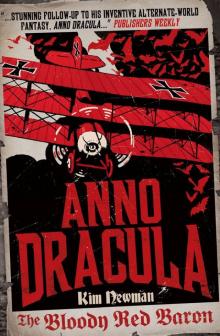 The Bloody Red Baron
The Bloody Red Baron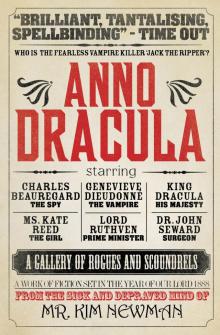 Anno Dracula
Anno Dracula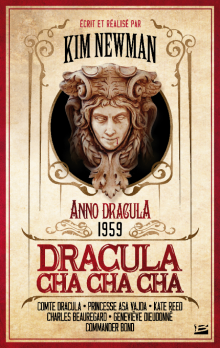 Dracula Cha Cha Cha
Dracula Cha Cha Cha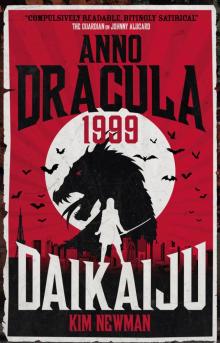 Anno Dracula 1999
Anno Dracula 1999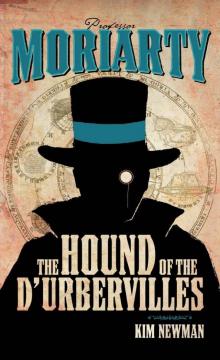 Moriarty: The Hound of the D'Urbervilles
Moriarty: The Hound of the D'Urbervilles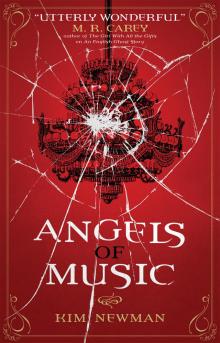 Angels of Music
Angels of Music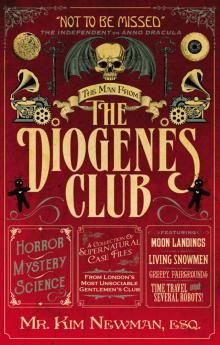 The Man From the Diogenes Club
The Man From the Diogenes Club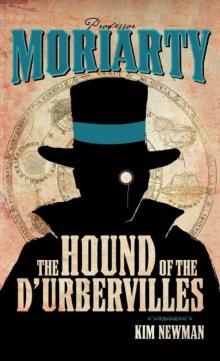 Professor Moriarty: The Hound Of The D’urbervilles
Professor Moriarty: The Hound Of The D’urbervilles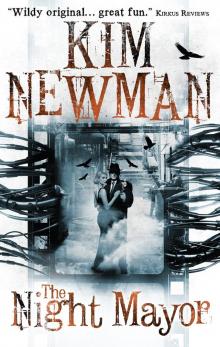 The Night Mayor
The Night Mayor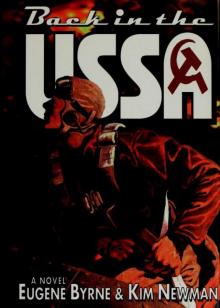 Back in the USSA
Back in the USSA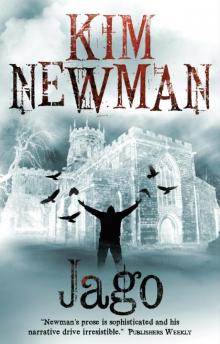 Jago
Jago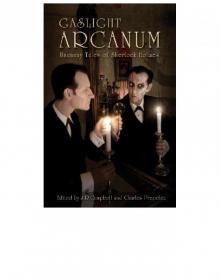 Gaslight Arcanum: Uncanny Tales of Sherlock Holmes
Gaslight Arcanum: Uncanny Tales of Sherlock Holmes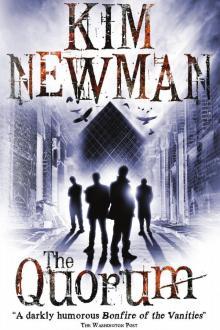 The Quorum
The Quorum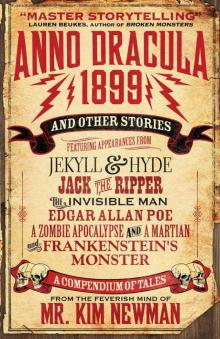 Anno Dracula 1899 and Other Stories
Anno Dracula 1899 and Other Stories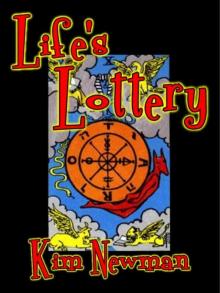 Life's Lottery
Life's Lottery The Secrets of Drearcliff Grange School
The Secrets of Drearcliff Grange School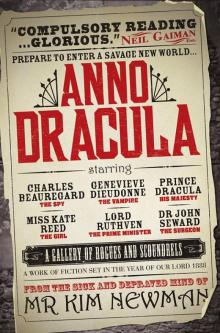 Anno Dracula ad-1
Anno Dracula ad-1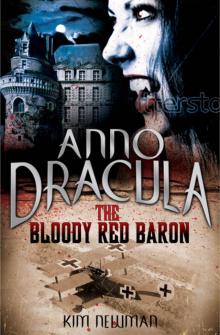 The Bloody Red Baron: 1918 ad-2
The Bloody Red Baron: 1918 ad-2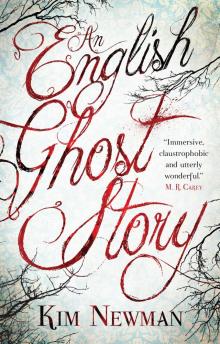 An English Ghost Story
An English Ghost Story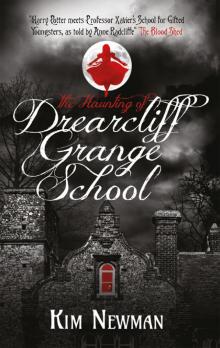 The Haunting of Drearcliff Grange School
The Haunting of Drearcliff Grange School The Other Side of Midnight
The Other Side of Midnight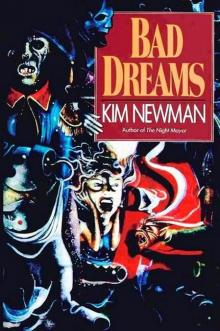 Bad Dreams
Bad Dreams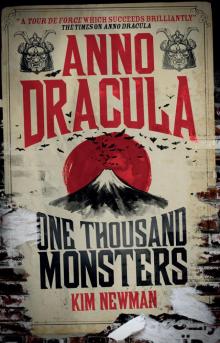 Anno Dracula--One Thousand Monsters
Anno Dracula--One Thousand Monsters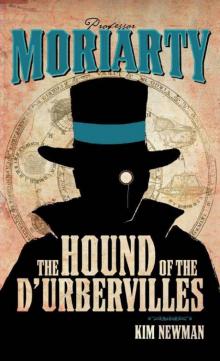 The Hound Of The D’urbervilles
The Hound Of The D’urbervilles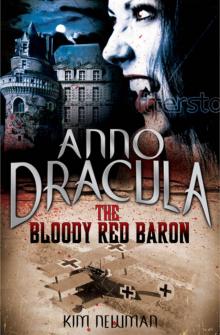 The Bloody Red Baron: Anno Dracula 1918
The Bloody Red Baron: Anno Dracula 1918